
|
OKLAHOMA CASE FILES |

|
|---|
Reefer Madness Case Files
The following article is taken from July 1945 issue of True Detective Magazine. While not exactly the best journal for objective material, it still does contain a well documented [note that names and locations are given], story on exactly what happened. Or at least what the Narc's wanted us to know about the case.
THE DEADLY GREEN GODDESS - BY William Gilman:
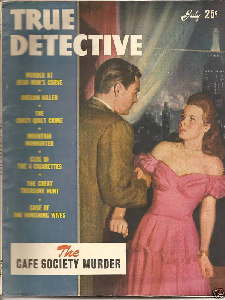
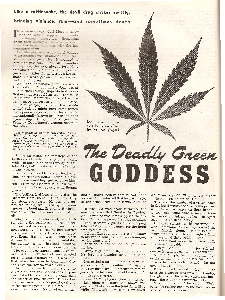
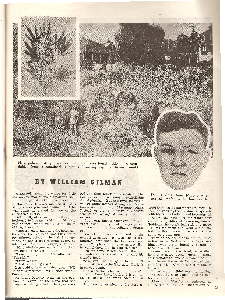
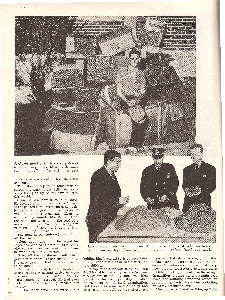
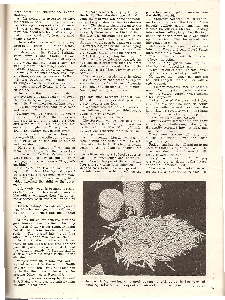
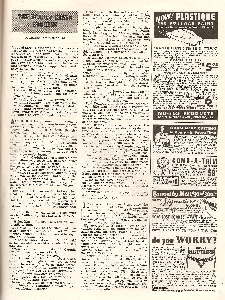
True Detective Magazine - July 1945
Like a rattlesnake, the devil drug strikes swiftly.
bringing violence, ruin-and sometimes death
In a general way, Carl Murphy knew that he wasn’t supposed to smoke marihuana cigarettes. Something about their having a bad narcotic effect upon the brain; that was why the law prohibited them.
But Murphy, who was a hotel bellhop in Oklahoma city, Oklahoma, didn’t take all that very seriously. It sounded to him like just some more stuff, another killjoy law, the cops always borbiding this and that. But he was twenty-seven years old. After all, be wasn't a kid any more. He was a grown man with a wife and two children. Well, the marihuana plant is a scientific riddle. It contains a drug which acts in such strange, unpredictable ways that even doctors seldom use it any more on patients ---too much chance of the cure being more dangerous than the disease.
And if Murphy had taken the trouble to find out, he might have come across this opinion expressed by Uncle Sam's internationally known leader in the fight against dope, Harry J. Anslinger, the Treasury Department’s Commissioner of Narcotics:
The marihuana plant is tall, stately and an object of beauty. It is sometimes called a Green Goddess. But in that beauty there lurks a coiled rattlesnake . . . I believe that informed public opinion is the most powerful weapon with which to fight this dangerous public enemy.So let us follow the footsteps of the bellhop and watch the strange things which happened on that Sunday of October 31st, 1943, the day when the "rattlesnake" struck.
Let us look upon Murphy without emotion, as a scientist would. Without knowing it, he was making a guinea pig of himself. From the evidence it is now easier to understand how mysterious marihuana works.
The bellhop had been employed at the Biltmore Hotel there in Oklahoma City for about six years. He was a goodnatured fellow, well hired by the manager of the hotel and its guests. His home was on a farm a few miles south of the city.
Murphy wasn’t abnormal, which is something the reader should remember. He was neither crazy nor queer. Like most persons, of course, he had worries from time to time, but he didn’t brood over them. His mind was all right. When it came to liquor, he wasn’t a teetotaler, but neither was he a habitual drunkard. He could take liquor or leave it alone.
Nor could he be called a habitual criminal. Back in 1937, he had been arrested for smalltime bootlegging. It was after that when he came to Oklahoma City and gave the law no more trouble.
His buddy at the Biltmore was another veteran bellhop, red-headed Jack Eugene Lea. Like Murphy, he was a young man and father of two children. It was Lea who used marihuana frequently, off and on for several years. He claimed that it gave him a pleasant feeling of excitement and he didn't believe that it had made slave of him --- he felt that he was master of the drug, using it only whenever he felt like it.
It was Lea who again furnished the marihuana on that Sunday in October. And it was he who later supplied the details of what happened first that morning. The Biltmore's guests were sleeping late and there wasn't much for the hotel employees to do.
Bellhop Lea sauntered across the lobby to his friend Murphy, who was lounging by the eager stand.
"You don't look so hot, Carl,” he remarked.
Murphy grunted. "Oh, I feet all right. It's just this hanging around, nothing to do."
Lea patted a pocket of his uniform. "I got some stuff," he confided. "I ran into that guy down by the interurban station yesterday afternoon. He sold me enough to make six reefers"
"Yeah?" Murphy was showing interest. Lea glanced around the lobby and yawned. "Let's leave the joint for a little while. We won’t be missed. How about it? Want a puff? Want to get high?"
"Sure, let's go up to 416."
That was the number of a vacant room in the hotel which the two bellhops used when time was heavy on their hands---where they could take a nap or have themselves a drink from a bottle of liquor they liked to keep handy.
But their relaxation this morning was with marihuana. When they reached the room, Murphy flopped on the bed and lazily watched his friend begin rolling a cigarette of the forbidden leaf.
"I don't want more than a few puffs this time, " he said.
“Okay,” Lea replied. "I'll just roll this one reefer and we can take turns with it.”
All told. Murphy had no more than five or six whiffs, inhaling deeply each time. It was his red-headed friend who did most of the smoking.
They flopped around a few minutes after the cigarette was finished. Finally, Lea glanced at his wrist watch and buttoned the coat of his uniform jacket.
“It’s nine o’clock,” he said. “We’d better be getting back to the floor. We’ve been gone a half hour.”
Apparently none the worse for their session with marihuana, the pair returned to the lobby and took up their positions, A few minutes later, Lea noticed that Murphy was gone and assumed that he was doing an errand for one of the Biltmore’s guests.
But shortly afterward, the bell captain beckoned to Lea and told him, "Murphy just phoned---wants you to come up to 416 right away.”
Some travelers came into the hotel just then and the red-head was busy, for a few minutes attending to their baggage. When he had a free minute again, he telephoned Room 416. Murphy answered,
“Hey, what do you want?" Lea asked, “I’m busy---I can’t come up.”
“Come on up here," the other said. I’m sick."
"From what?”
"That reefer, I guess."
Lea nodded into the telephone. “It'll do that sometimes. Well, stick tight---I'm coming up.”
He found Murphy lying on the bed, showing several of the signs that the drug was taking effect. His eyes were red and their pupils were dilated. The narcotic sometimes causes uncontrollable fits of giggling. But this time, its victim was groaning instead of laughing. Marihuana was up to one of its many tricks. Instead of giving Murphy a pleasant feeling of floating, it was giving him nausea.
"It's worse than a hangover, “ he said. "I feel awful . . . my head ... my stomach . . . Get me a bromo-seltzer, a double one."
Lea left the room and went to the nearest drugstore. He was back a few minutes later with the bromo-seltzer, which Murphy drank down eagerly. But he complained that he still felt sick.
Lea got some towels. soaked them in ice water and wrapped them around his friend’s head.
“Aw, you'll, be all right," he said. "I got to get back to the floor now. I’ll look in on you again."
But when he returned to Room 416 about an hour later, he found it empty, Lea shrugged and went back to his duties.
And now let us pick up the story as Murphy himself remembered it later. He recalled smoking the marihuana cigarette with his fellow bellhop, and becoming ill.
After that, things became rather hazy and not very different from a nightmare. Suddenly, he didn’t feel sick any more. He left the room and went out of the hotel without knowing where he was going or caring much.
Then he decided that he wanted to go to heaven. At first, when the idea struck him, it was just an impulse. It quickly became an obsession.
Somewhere on the street, he recalled, he met a negro youth whom he knew only casually as somebody named “Alec," And the marihuana drifter decided then and there that Alec should take him to heaven.
But Alec didn't think much of the idea. He suggested, instead, “Let’s go to a tavern for some beer.” After that, Murphy remembered, he and Alec had a fight, but he couldn’t re
call what it was about, or how the affair had ended.
Then the bellhop found himself in an automobile parking lot, still very seriously trying to figure out how to leave this world.
Soon, he saw how, it could be done. He decided to climb upon the roof of one of the parked cars. From there, he ought to be able to grab onto a telephone wire which was overhead. Then he would swing himself, like Tarzan, from the telephone wire on to the roof of a near-by building. That would bring him very near to heaven and with a long jump, he might make it.
The next he remembered falling off the car.
Along about this time, he forgot his eager desire to go to heaven. Something else was on his drug-crazed mind now---he wanted to join the Army.
It wasn't the marihuana itself which gave him this idea. He had thought about it a good deal. but had not known what to do about it.
On the one hand, he had wanted to enlist, feeling a normal desire to wear the uniform of his country, and be looked upon with respect. He had even pictured himself winning medals for bravery.
On the other hand, there were things holding him back, all sorts of uncertainties, plus the fact that he had a wife and two children.
On top of this, he was dangling. His draft board had recently reclassified him, placing him in the 1-A category, which meant that he would probably be called up soon for his physical examination. But there was some sort of delay and as a result. the bellhop was jittery, not knowing what plans he ought to make.
But marihuana stepped in with the decision. The obsession came over Murphy now to go to the Federal Building there in Oklahoma City and enlist in the Army. In addition to being the city's main post office, the building contained offices of several other Federal agencies, including an Army recruiting office.
Murphy remembered walking up Robinson Street and entering the Federal Building.
At this point, it is necessary to leave the bellhop's story and follow his movements through the eyes of other witnesses.
It was at one o'clock that Sunday afternoon, about four hours after Murphy had his borrowed puffs from the marihuana cigarette.
Three sailors came out of a drugstore at the corner of Third and Robinson Streets, which directly across the street from the Federal Building. They were Claude Smith. Edward Oscopinski and John Zeitner, all enjoying a week-end leave from a Naval air training center at Norman, Oklahoma.
While standing on the corner, wondering what to do with themselves next, something interesting happened to them.
It was Murphy, who without any warning or excuse whatsoever, came up to them, grabbed Zeitner and bit him on the neck.
The sailors thought he was a drunk of a peculiar type and pushed him away. He came back, swinging his fists. Once again, the Navy men pushed him away.
"G'wan," one of them said, "Go home and sober up.
Murphy walked north on Robinson Street a few feet. Then the sailors saw him stop in front of a passing soldier and swing at him. But the soldier, too, evidently thought that Murphy was only drunk and simply shoved him away.
The sailors kept on watching the strange civilian, marveling at how a man could be so drunk and still be able to walk so steadily.
"He sure can handle it," said one of them. "But did you see that crazy look in his eyes. Looks like he's been mixing white mule and torpedo juice." Then he tugged at his companions, "Hey, let's get him!"
The coiled rattlesnake had struck again. This time Murphy, had stepped up to a small boy walking on the sidewalk and given him a smashing blow which knocked the child to the pavement.
A few quick bounds brought the sailors to the scene. They went to work on him with a vengeance, their fists battering soberness back into him --- or so they thought.
But after taking a considerable pounding, Murphy managed to break away. He ran up the steps into the Federal Building.
At first, the sailors believed they had given him a sufficient beating. Then they wondered if the vicious stranger might not still, have some mischief left in his system. They started into the building after him but the man had vanished.
On that; Sunday, there was little activity in the Federal Building and the post office, of course, was closed. One, of the building guards, J. Slayton Smith, sixty-one years old, was also running the elevator.
Murphy went up to him and said he wanted to enlist in the Army. Smith waved him into the elevator and took him up to the third floor. The Army Recruiting Office was in Room 327.
The story is now taken up by Sergeant F.J. Padgett, who was the enlisted man on duty in that office.
He heard somebody singing loudly in the hall. Then the door opened and in came the man who was doing the vocalizing. Padgett stared at him in astonishment. The cheerily singing stranger was very much the worse for wear. He had evidently been in some kind of fight. His face was bleeding and both of his eyes were swollen lividly, with all signs that they would soon be a pair of shiners.
Nevertheless, the civilian was singing. He came up to the Sergeant's desk. gave a sweeping salute, and said briskly:
"Carl Murphy reporting for duty, sir,"
Padgett was considerably puzzled. He had not been informed that the office staff was to be increased. And if the stranger was a soldier, why wasn't he in Army uniform?
"Let me see your credentials," he asked. But Murphy brushed past the Sergeant and seated himself at the desk. There he began fingering through a pile of index cards lying on top of the desk.
By this time Sergeant Padgett concluded that he was dealing with a pretty troublesome drunk.
"Get away from that desk,” he ordered, “and tell me just what you think you’re doing in here anyway.”
But Murphy just sat there.
The Sergeant walked over to a filing cabinet to see if he had any records revealing who this “Carl Murphy” might be who was reporting for duty in such a strange manner.
At that moment, Murphy walked up from behind and struck him. Padgett whirled and hit back. The bellhop swung again, knocking Padgett against the desk.
An officer, who was Padgett's superior, was in an inner office and heard the commotion. He opened the connecting door and saw what was going on. He stepped back to his desk and picked up the telephone, intending to call on the police to come and get this invader from the civilian world.
But Murphy had seen, him. It was remarkable how well the brain of the berserk bellhop could function. He guessed the officer's intention. Striding into the inner office, he yanked the telephone out of the man’s hand and hung up the receiver, Then he walked back into Padgett's office.
Meanwhile, the Sergeant had stepped into the hallway and seen Guard Smith there near the elevator.
“Come in here and get this drunk out of here!” he yelled.
The building guard came in, saw Murphy and grabbed his arm.
“Come on out of here," he said. “You ought to be ashamed of yourself."
He tugged the invader out into the hall and Padgett Shut the door and with a sigh of relief.
But a few moments later, he heard a sound of scuffling down the hall and then came the elderly guard’s voice calling “Hey, sergeant!”
Padgett opened the door and looked out. He saw the two men struggling with each other several doors down the hall. Smith’s revolver was in one hand and the guard was trying to keep it out of reach of his violent prisoner.
Then came the sound of a shot. A moment of silence followed, and a man began singing.
Padgett ran into the hall and up to the body of Smith, lying on the floor. The guard was dead. He had been shot directly between the eyes.
The gun was on a chair. And Murphy was walking away down at the far end of the hall, singing lustily.
The Sergeant put in a telephone call for the police. (continued on page 109)
==== page109 -- (Continued from page 55)
A squad arrived quickly and began searching for the killer, who had by this time disappeared from the third floor. The cops guessed he must still be near, however, because this was a Sunday and stairways leading down to the first floor were barred so that anybody leaving an upper floor would have to use the elevator.
They found their quarry on the fourth floor. He had walked up a flight of stairs and seated himself in an open elevator, waiting for somebody to take him down, unmindful of the fact that he had killed the man who ran the elevator.
He was still eager to fight, but the policemen subdued him quickly and took him to Headquarters.
Detective Captain 0. C. Brown started questioning Murphy but soon discovered this was no ordinary homicide. Murphy babbled like a maniac, reciting all sorts of nonsense about trying to go to heaven, with frequent interludes of giggling and singing.
ALTHOUGH the prisoner didn't seem to mind it any, he had been beaten up considerably in his series of fights. Captain Brown called in Dr. R. C. Mills, the city health officer, to examine Murphy.
Dr. Mills reported that all of the prisoners injuries were minor ones. Nor could he smell any alcohol on Murphy's breath. “He’s not drunk, but his mind is clouded,” he reported. "We'll have to wait and see. If it’s dope, he'll come out of it. If it isn’t, he’s dangerously insane.”
To himself, Captain Brown wondered how much difference there was between being crazed by dope or plain crazy. He sent the prisoner with the battered face and black eyes to the city jail for safekeeping.
The three sailors had seen Murphy being taken out of the Federal Building by the police and, hearing that a man had been killed, came forward with their story. And there was also the statement from Sergeant Padgett.
But Captain Brown wanted to know just what had started the prisoner on his rampage. He sent detectives to the Biltmore Hotel where they learned that Murphy had been seen leaving the building sometime between ten o'clock and ten-thirty that morning.
"Before that, he was up in a room with another bellhop named Jack Lea," they reported.
"'Bring him in," Brown ordered. "I want to talk to him."
Lea was off duty at the time, but two police officers, Jack Vaughn and William Pickney, found him at his home and brought him to Headquarters.
He had no information to offer. He said he absolutely no idea of what had got into Murphy.
"You two been using dope?" Captain Brown demanded suspiciously.
"Absolutely not," Lea insisted.
But Brown had a hunch that there was a narcotic drugs angle somewhere in this case. There seemed to be no other reason why a chap like Murphy, whom other hotel employees described as good-natured and normal, should suddenly go berserk.
He ordered that Lea be searched and booked for further questioning.
In one of the bellhop's pockets was found a matchbook. It contained a small "snipe" of a marihuana cigarette,
Confronted with this evidence, Lea admitted that he and Murphy had been using the drug. He gave the details about the session in Room 416, how Murphy had become ill, and then disappeared.
He explained that when he heard that Murphy had been involved in a shooting, he decided to get rid of his marihuana. He threw it into the hotel furnace, but had forgotten to get rid of the cigarette butt which was found in the matchbook.
"I guess I'm to blame for the whole mess," he said. "But I didn't expect anything like this to happen, He only had a few puffs on the cigarette."
Captain Brown tried to question Murphy again. The bellhop had lost some of his hysteria but wasn’t rational enough yet to give a coherent statement. He could remember only fragments of what had happened---becoming ill, the fight with Alec, wanting to go to heaven, wanting to enlist.
He didn't remember striking the soldier and the boy, or the fight with the sailors, but he remembered entering the Federal Building to enlist.
At this point, he jumped up and said he believed that he had shot a man there. He was hysterical again now, and the questioning had to be called off.
Two Federal law-enforcement agencies, meanwhile, had entered the investigation. The FBI was concerned because a Federal employee had been killed on Government property. And the Treasury's Bureau at Narcotics wanted to run down the source of the marihuana.
On Tuesday, the second day after the killing, Murphy was questioned again, this time by a Special Agent of the FBI. But the prisoner still couldn't give a coherent story, and insisted he had no recollection of killing the building guard. He revealed that at one time after leaving the Biltmore, he had decided to go to heaven by jumping out of a building window. But he had changed his mind, realizing he might get hurt that way.
Then his mind began wandering again, while the G-man tried in vain to bring him back to the story of his movements on Sunday. Murphy said that he was like Daniel in the lions' den. But he could find no lions. He saw some sort of white line. If he could cross that line, he'd be safe. But somebody was pulling him away.
Later in the day, however, he was far enough out of marihuana's effects to talk normally, and to realize the horror of what he had done.
Interviewed by a newspaper reporter, Murphy referred to the movie version of Dr, Jekyll and Mr. Hyde.
“It’s like a picture show I saw once," he said. "A man took a kind of a drink and turned into a monkey ... and killed people. It's hard for me to believe what they say I did. I feel bad and hurt inside like I lost everything I had. I've got to wake up and find it's just a dream."
He appeared in Federal Court on November 13th, with an application for bail. After hearing the story, Judge E. S. Vaught ordered the man back to jail pending trial, At this hearing, which was two weeks after the killing, Murphy insisted that he still could not remember the lights on the street or the shooting, or even being arraigned before a United States Commissioner the next day.
Meanwhile, Agent W. H. Crook of the Bureau of Narcotics joined with city detectives in tracing the source of Lea's marihuana. Their trail led them a month later to a squalid shack in "Sandtown," a slum settlement in Oklahoma City. Here they found two half-gallon jars, a quart jar and several tobacco tins, all crammed full of marihuana. Three negroes who lived in the shack were arrested and eventually convicted on Federal charges of possession and sale of the narcotic.
Crook's investigation turned up the fact that bellhop Lea, one of their customers, had been arrested in Dallas back in 1937 for possession of marihuana and had gone to jail at that time for three months, on orders of a county Judge.
Both Lea and Murphy went on trial in Federal Court three months after the killing. The former pleaded guilty to a charge of illegally obtaining marihuana, and was sent to the penitentiary for five years.
A Federal Grand Jury had indicted Murphy for the murder. He waived a jury trial when United States Attorney Charles S. Dierker presented the case to Judge Vaught.
Murphy was entirely normal when he took the stand and repeated his story of remembering nothing of the crime which had been committed while in a marihuana stupor.
Judge Vaught found the prisoner guilty of voluntary manslaughter and sentenced him to ten years in the penitentiary.
That was the end of the case so far as the stupefied bellhop was concerned. But it is not the end of the marihuana menace, which has had a long and weird history abroad. Like a plague, it struck the United States in the late 1920's. At first, it was known only in the underworld but along about 1935, it was discovered that thrill-hungry young people were staging wild parties, using marihuana reefers to intoxicate their senses.
HOW the menace has been fought is explained by Narcotics Commissioner Anslinger, who is known not only in this country but throughout the world as a leader in the battle against dope.
He calls it "a new peril---in some ways the worst we [..] met, and it concerns us all.
"About 1935," he relates, "we were stunned with the rapid wildfire spread of this drug which had been virtually unknown in the United States. By the following year it had become such a major menace as to call for the enactment of national-control legislation. Nearly every state had suffered from the insidious invasion of this drug. It spread to new circles not previously contaminated by drug addiction: to young, impressionable people.
"We urged and obtained marihuana legislation in all of the forty-eight States. Then to co-ordinate the problem, Congress passed the Marihuana Tax Act of 1937, bringing the drug under Federal control. This law requires all persons dealing with the drug in any way to register with the Government and pay a special tax. It restricts the use of marihuana to industrial, medical and scientific purposes. Violations are punishable by five years' imprisonment."
Mr, Anslinger has realized that laws alone are not enough and wants the public to understand that marihuana is a common enemy. Too many persons have smoked marihuana in the mistaken belief that it would not harm them, that it isn't a sinister drug like opium or morphine.
In some ways, it's even more treacherous than opium, which has certain legitimate medical uses.
"Unlike opium, which is the good in Jekyll and the bad in Hyde, marihuana is Hyde only," the Commissioner explains. "The medical profession, which knows it as Cannabis sativa, has practically abandoned its use because of its unpredictability and extreme variability of effect. It depresses some people and stimulates others. It turns wrong into right. It incites to violence. It distorts speech, vision, hearing. A person under marihuana's spell loses sense of space and time. No one can foretell the result of its use.
"Marihuana destroys mental fabric; insanity frequently results from its continued use. Our only way of testing it is to try it on dogs. If the dog’s legs get tangled up, the drug is potent. If you go on giving the dog marihuana, his brain is destroyed."
Aside from the fact that some people have fooled themselves into thinking the drug is harmless, the use of marihuana has spread because it does not have to be smuggled in from abroad. Opium comes from the Near East and Orient, but marihuana is found all over the world.
The marihuana plant is the same as the hemp plant, fibers of which are used for making rope and its seeds are sold as bird food. Federal sleuths have found marihuana patches growing in empty lots in Brooklyn. The plant is also found growing wild along riverbeds, and along the roadsides. Illegal growers sometimes try camouflage by planting the marihuana in the center of cornfields.
Here again, Mr. Anslinger wants cooperation from the public.
"If you believe that marihuana is being used or sold illegally; if you know of a tract of land where it grows or is being cultivated contrary to law, you should report these infractions to the police authorities."
He points out that Government and university scientists have been studying the plant in order to learn more about the narcotic it contains. Addicts have used this drug in several ways. The dried leaves and flowering tops have been used in tobacco form by the American underworld, which has given marihuana such nicknames as "reefers," "muggles" and "hay."
For medical purposes, it has been used in extract form. And in the Near East, a powder made from the plant has been eaten by addicts.
"The origin of marihuana is shrouded in the mists of antiquity," Commissioner Anslinger says. "For centuries, it has been a problem in many parts of the world. Homer was its prophet, Marco Polo its advance courier. Abroad it is called Kif, Dagga, Bhang, Charas, Ganja and Hashish."
But whatever its name and method of use, it's the same coiled rattlesnake. When one looks into Its history, it is not surprising that bellhop Murphy, stupefied by the drug, should have become violent and killed a man. For it is this drug which has given us the word "assassin."
It happened back in the Eleventh Century, in the days of the Persian poet, Omar Khayyam. One of his boyhood friends was Hassan Ben Sabbah, who grew up into a rebel chieftain. He gathered a band of followers around him and in the year 1090, captured the powerful Persian fortress of Alamut.
IN ORDER to increase his power, he hit upon something more effective than open warfare. Whenever he wanted a rival sheik put out of the way, he had him murdered secretly.
The killing was done by young men who wanted to join the band. These candidates were known as the Devoted Ones, and their entrance examination into the band was a murder. Before setting out to kill, they first stupefied themselves by eating hashish.
They became known as the hashshashin --- "hashish-eaters"---and it was from that word that the term "assassin" was derived, meaning anybody who slays in secret.
Whether it is called hashish or marihuana, it is a bad actor. That is why Uncle Sam has gone a long way toward stamping it out and wants to see the job finished.
"This can be done without sensationalism," says Commissioner Anslinger. "If youth is properly informed about the dangers of marihuana, that knowledge should not invite experimentation. The time to stamp out marihuana is now---before it places an indelible stamp upon the easily molded mentality of our youth, who seem to be its chief victims. Here is challenge to every right-thinking person. [Note some modern-day spelling changes made by transcriber]
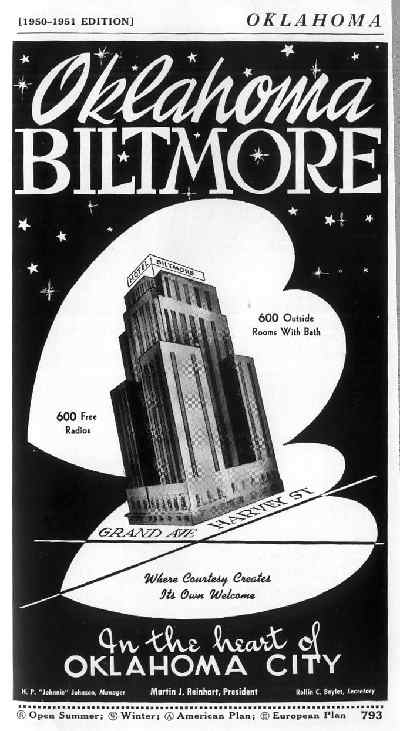
The Biltmore Hotel, Era 1952
WANT TO KNOW MORE:
=====================
Due to space / download time considerations, only selected materials are displayed. If you would like to obtain more information, feel free to contact the museum. All our material is available (at cost) on CD-Rom format.
CONTACT PAGE
 OKLAHOMA GORE MAIN PAGE |
GORE FILE CASES  NEXT PAGE |